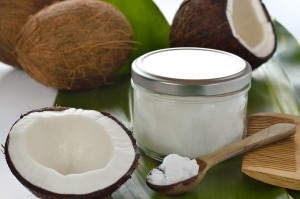By Anthoney J. Andersen – Steroidal.com
When it comes to proper nutrition and diet, the way you prepare your food, is just as important as the ingredients they contain. If you’re someone who loves cooking stovetop meals, then it’s safe to say that you probably use some sort of non-sticking cooking oil.
One of the more common forms of oils used in foods is coconut oil.
But just how beneficial is coconut oil to your health, as opposed to vegetable, canola, or soybean oil?
Follow along, as we uncover the truth behind the coconut craze.
BACKGROUND
Coconut is the fruit of the coconut palm. The oil of the nut (fruit) is used is make medicine. Some coconut oil products are referred to as ‘virgin’ coconut oil. This often refers to the fact that the oil is generally unprocessed.
Like all fats, coconut oil is a blend of fatty acids. Coconut oil contains an unusual blend of short and medium chain fatty acids – primarily lauric (44 percent) and myristic (16.8 percent) acids. It’s this unusual blend that may offer some health benefits.
According to WebMD, coconut oil is used to help treat diabetes, chronic fatigue, Crohn’s disease, irritable bowel syndrome (IBS), Alzheimer’s disease, thyroid conditions, energy and boosting the immune system.
Previously disregarded by the health and wellness community for high saturated fat content, the sale of coconut oil has increased significantly in recent years. Coconut oil can be found in specialty health food stores and in most local grocery stores.
Manufacturers have been substituting other packaged oil products – like vegetable oil – for the healthier coconut oil. There have been claims that using coconut oil can help in the advancement of weight loss, and even slow the progression of Alzheimer’s.
“There is very limited information on disease outcomes,” said Dariush Mozaffarian, MD, researcher and co-director of the cardiovascular epidemiology program at Harvard Medical School and Harvard School of Public Health.
“All that has been studied well is the impact of coconut oil on cholesterol levels, and the findings are intriguing. However, we still don’t know if it is harmful or beneficial,” said Mozaffarian.
POSSIBLE BENEFITS
According to Medicalnewstoday.com (MNT), a randomized clinical trial was conducted, where 40 participants were given either two tablespoons of coconut oil or two tablespoons of soybean oil once a day for 12 weeks.
During that time, researchers found that the soybean oil group saw their HDL level (good cholesterol) go down and their LDL level (bad cholesterol) go up. Both are indicators of an increased risk for cardiovascular disease.
On the other hand, the coconut oil group did not experience a significant change in their cholesterol numbers, but did have a higher HDL level.
COCONUT OIL AND DIABETES
According to the American Diabetes Association, 25.8 million children and adults in the United States (8.3 percent of the population) have diabetes. One of the most popular drugs for treating diabetes – Avandia – was pulled off the market in 2011, after a number of studies showed that the drug increased the risk of heart attacks among individuals with type 2 diabetes.
Fortunately, medical research is beginning to show that type 2 diabetes is an issue that can be reversed through proper diet, rather than the use of drugs.
According to an article on CNN.com, “Reversing Diabetes is Possible” by Val Willingham, restricting refined sugar, refined carbohydrates, and alcohol from one’s diet – while increasing healthy saturated fats – can reverse type 2 diabetes.
Willingham reported that replacing longer chain polyunsaturated fats – such as corn and soybean oil – with the saturated fat of coconut oil, can help reduce cravings for refined carbohydrates that contribute to insulin resistance.
Another benefit of coconut oil is that it has the ability to help stave off hunger. According to the National Institutes of Health, this may be related to the way the fatty acids in it are metabolized, because ketone bodies (chemicals that the body makes when there is not enough insulin in the blood and it must break down fat instead of glucose for energy) can have an appetite reducing effect.
According to a study by the Department of Psychiatry and Behavioral Sciences at Duke University Medical Center, varying amounts of medium and long chain triglycerides (MCT, LCT) were fed to six healthy men.
The study found that the men who consumed the most MCTs ate 256 fewer calories per day, on average. It was also discovered that those who ate the most MCTs at breakfast, ate significantly fewer calories at lunch.
CONCLUSION
Fats are an essential part of a healthy diet. However, the trick is to eat enough fat – not too much – and choose the best fats as often as possible.
According to the 2010 Dietary Guidelines, fats should make up 20-35 percent of total calories – saturated fats should be less than 10 percent. And even though coconut oil is a liquid, the Dietary Guidelines consider it to be a solid fat, that they recommend Americans reduce, along with added sugars.
“Foods that contain coconut oil are not usually nutrient powerhouses, so it is better to choose your saturated fats from foods that are nutrient-rich, like cheese and lean meats,” said Connie Diekman, Med, RD, and director of university nutrition at Washington University in St. Louis.
“As long as you keep the amount of saturated fat to less than 10 percent of calories, the choice is up to you.”








